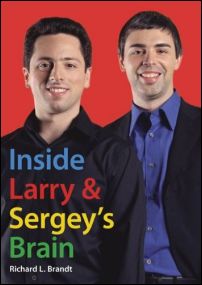
Richard L. Brandt wrote a book titled “Inside Larry and Sergey’s Brain”, and it’s now available on Amazon. Amazon’s descriptions says the book “skips past the general Google story and focuses on what really drives these men and where they will take Google in the future. Richard L. Brandt shows the company as the brainchild of two brilliant but individual men and looks at Google’s business decisions in light of its founders’ ambitions and beliefs.” Richard answered a couple of my questions via email.
Q: What inspired you to write this book?
I worked on this book off and on for four years. I first became interested in writing about Google before the IPO.
When I was at Business Week in the mid 1980s I had a chance to write a book about Microsoft. I just knew Microsoft was destined to become a huge force in the computer industry. For various reasons I never did the book.
Google was the first company that I felt as strongly about as I did Microsoft in its early days. I started following its business model, and knew it had the right formula. This time, I knew I had to write a book. It was delayed for a few years while I was busy with other things, then had trouble finding an agent who believed I could say something new about Google. A year ago I found one, sold the proposal and wrote the book. There was no other book I wanted to do. The book is only as good as my passion for writing it.
I knew it was an exceptional company that had many things to teach entrepreneurs. Every time there’s a paradigm shift in technology, one or two companies figure out how to really exploit the new technology and become powerful leaders. Microsoft did that in software, Intel in hardware. (Apple is a different case; its strength is design, not business strategy.) Google is it for the Internet, the successor to Microsoft not in business strategy, but in leading the new generation of companies tapping into the zeitgeist of the Internet.
Whereas Bill Gates saw the potential of the microprocessor and the need for standards in his day, positioning Microsoft to control them, Larry and Sergey understood the open nature of the Internet, the power of its interconnected nature, and knew that it would be extremely important to help people tap its potential.
Bill Gates was an idealist about getting a computer on everyone’s desk because he wanted one himself and knew that millions of others would as well. He also smelled money. Larry and Sergey were idealists about the importance of the internet to change people’s lives. They simply worked harder to create the best search engine they could, even willing to knock advertisers down a peg or two in importance, because this was too important to the world to screw up. Idealism goes a long way on the Internet.
I’m fascinated with corporate ethics and like the fact that Google is not driven by the need to maximize shareholder value every quarter. They refuse to mess up search results with ads. They push openness, free products, and do everything they can to get more people online. Because the Internet offers so much competition, only the true idealists get it right.
Q: Was it hard to get to interview Larry or Sergey for the book? How long did you talk to them?
Larry and Sergey are extremely private individuals and are shy of the press. I could not get official interviews with them. But I used every opportunity I could to run into them. Since I recognized the incredible nature of the company, I invested in the IPO, buying stock at $85 (I sold it all before writing the book, at about $500.) As a stockholder I got to attend all the shareholder meetings. I listened to them there and asked questions. (In the early shareholder meetings, reporters were not invited [...] so I got exclusives.) I went to Google parties and used every excuse I could to visit the Google campus, talking to them whenever I ran into them. I blogged about Google and listened in on every conference call I could. I picked up bits and pieces over the years. But I only had short conversations with them, never an interview.
Google then gave me access to anyone I wanted EXCEPT Larry and Sergey. So I interviewed friends, Google execs, former Google execs, professors and colleagues. With every source, I focused on their impressions of Larry and Sergey and why they did things the way they did.
After years of observing them and evaluating their moves against the view I had developed of their passion and idealism, I felt I knew them as well as any outsider could. Since I don’t know them personally, there are certainly limitations to my knowledge. They are hugely ambitious and are still discovering what they’re capable of. They’re still evolving and will continue to surprise all of us. When I told Eric Schmidt I wanted to get inside their brains, he said, “Good luck.” But I tried to get deeper into their brains than anyone else had.
The last thing is that I’m impressed by their idealism. It’s real, and it keeps them ahead of the competition. They’re good guys. And hugely ambitious.
No comments:
Post a Comment
thanks for making Comment here.
Note: Only a member of this blog may post a comment.